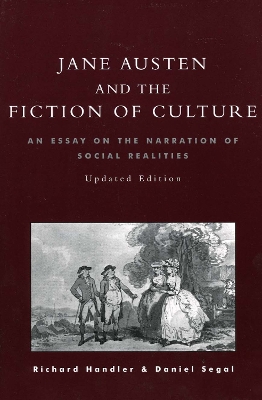The Anthropology of Form and Meaning
1 total work
Jane Austen and the Fiction of Culture
by Richard Handler and Daniel Segal
Published 1 September 1990
With a new introduction by the authors, this paperback edition of Jane Austen and the Fiction of Culture takes the complete body of work of a major novelist as the basis for rethinking ethnographic representation and cross-cultural analysis. Authors Handler and Segal have approached Jane Austen's writing as a source for interpreting the cultural ideology of kinship, social rank, courtship, and marriage in Austen's England. Arguing against the conventional reading of Austen as portrayer and upholder of a well-ordered society, they evaluate the rhetorical techniques that make Austen an effective ethnographer of diverse, though intertwined social realities. They show that Austen undercuts any and all claims to "truth universally acknowledged"—that is, to objective, positive knowledge of human affairs. Jane Austen and the Fiction of Culture invites the reader to confront an ethnography of another time and place whose insights have a direct bearing on contemporary concerns in the humanities and human sciences.
